Related Research Articles
A subsidy, subvention or government incentive is a type of government expenditure for individuals and households, as well as businesses with the aim of stabilizing the economy. It ensures that individuals and households are viable by having access to essential goods and services while giving businesses the opportunity to stay afloat and/or competitive. Subsidies not only promote long term economic stability but also help governments to respond to economic shocks during a recession or in response to unforeseen shocks, such as the COVID-19 pandemic.

Resource depletion is the consumption of a resource faster than it can be replenished. Natural resources are commonly divided between renewable resources and non-renewable resources. The use of either of these forms of resources beyond their rate of replacement is considered to be resource depletion. The value of a resource is a direct result of its availability in nature and the cost of extracting the resource. The more a resource is depleted the more the value of the resource increases. There are several types of resource depletion, including but not limited to: mining for fossil fuels and minerals, deforestation, pollution or contamination of resources, wetland and ecosystem degradation, soil erosion, overconsumption, aquifer depletion, and the excessive or unnecessary use of resources. Resource depletion is most commonly used in reference to farming, fishing, mining, water usage, and the consumption of fossil fuels. Depletion of wildlife populations is called defaunation.
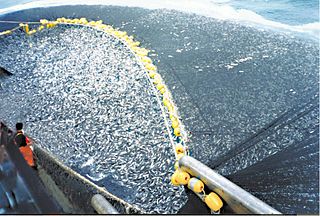
Overfishing is the removal of a species of fish from a body of water at a rate greater than that the species can replenish its population naturally, resulting in the species becoming increasingly underpopulated in that area. Overfishing can occur in water bodies of any sizes, such as ponds, wetlands, rivers, lakes or oceans, and can result in resource depletion, reduced biological growth rates and low biomass levels. Sustained overfishing can lead to critical depensation, where the fish population is no longer able to sustain itself. Some forms of overfishing, such as the overfishing of sharks, has led to the upset of entire marine ecosystems. Types of overfishing include growth overfishing, recruitment overfishing, and ecosystem overfishing. Overfishing not only causes negative impacts on biodiversity and ecosystem functioning, but also reduces fish production, which subsequently leads to negative social and economic consequences.

A conventional idea of a sustainable fishery is that it is one that is harvested at a sustainable rate, where the fish population does not decline over time because of fishing practices. Sustainability in fisheries combines theoretical disciplines, such as the population dynamics of fisheries, with practical strategies, such as avoiding overfishing through techniques such as individual fishing quotas, curtailing destructive and illegal fishing practices by lobbying for appropriate law and policy, setting up protected areas, restoring collapsed fisheries, incorporating all externalities involved in harvesting marine ecosystems into fishery economics, educating stakeholders and the wider public, and developing independent certification programs.
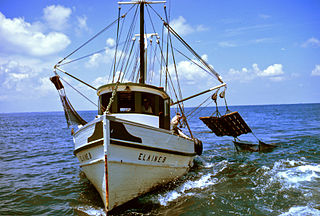
The fishing industry includes any industry or activity that takes, cultures, processes, preserves, stores, transports, markets or sells fish or fish products. It is defined by the Food and Agriculture Organization as including recreational, subsistence and commercial fishing, as well as the related harvesting, processing, and marketing sectors. The commercial activity is aimed at the delivery of fish and other seafood products for human consumption or as input factors in other industrial processes. The livelihood of over 500 million people in developing countries depends directly or indirectly on fisheries and aquaculture.

The goal of fisheries management is to produce sustainable biological, environmental and socioeconomic benefits from renewable aquatic resources. Wild fisheries are classified as renewable when the organisms of interest produce an annual biological surplus that with judicious management can be harvested without reducing future productivity. Fishery management employs activities that protect fishery resources so sustainable exploitation is possible, drawing on fisheries science and possibly including the precautionary principle.
The Sea Around Us is an international research initiative and a member of the Global Fisheries Cluster at the University of British Columbia. The Sea Around Us assesses the impact of fisheries on the marine ecosystems of the world and offers mitigating solutions to a range of stakeholders. To achieve this, the Sea Around Us presents fisheries and fisheries-related data at spatial scales that have ecological and policy relevance, such as by Exclusive Economic Zones, High Seas areas, Large Marine Ecosystems and Ecosystems.

Unsustainable fishing methods refers to the use of various fishing methods to capture or harvest fish at a rate that is unsustainable for fish populations. These methods facilitate destructive fishing practices that damage ocean ecosystems, resulting in overfishing.
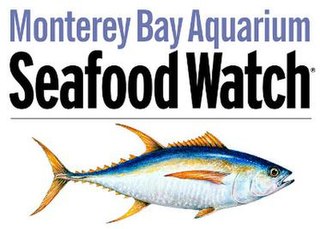
Seafood Watch is a sustainable seafood advisory list, and has influenced similar programs around the world. It is best known for developing science-based seafood recommendations that consumers, chefs, and business professionals use to inform their seafood purchasing decisions.
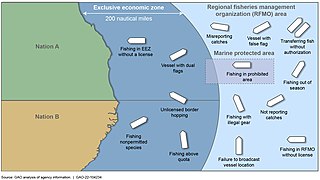
Illegal, unreported and unregulated fishing (IUU) is an issue around the world. Fishing industry observers believe IUU occurs in most fisheries, and accounts for up to 30% of total catches in some important fisheries.
Sustainable seafood is seafood that is caught or farmed in ways that consider the long-term vitality of harvested species and the well-being of the oceans, as well as the livelihoods of fisheries-dependent communities. It was first promoted through the sustainable seafood movement which began in the 1990s. This operation highlights overfishing and environmentally destructive fishing methods. Through a number of initiatives, the movement has increased awareness and raised concerns over the way our seafood is obtained.
Destructive fishing practices are fishing practices which easily result in irreversible damage to habitats and the sustainability of the fishery ecosystems. Such damages can be caused by direct physical destruction of the underwater landform and vegetation, overfishing, indiscriminate killing/maiming of aquatic life, disruption of vital reproductive cycles, and lingering water pollution.

China has one-fifth of the world's population and accounts for one-third of the world's reported fish production as well as two-thirds of the world's reported aquaculture production. It is also a major importer of seafood and the country's seafood market is estimated to grow to a market size worth US$53.5 Billion by 2027.

Ussif Rashid Sumaila is a professor of ocean and fisheries economics at the University of British Columbia, Canada, and the Director of the Fisheries Economics Research Unit at the UBC Institute for the Oceans and Fisheries. He is also appointed with the UBC School of Public Policy and Global Affairs. He specializes in bioeconomics, marine ecosystem valuation and the analysis of global issues such as fisheries subsidies, IUU fishing and the economics of high and deep seas fisheries. Sumaila has experience working in fisheries and natural resource projects in Norway, Canada and the North Atlantic region, Namibia and the Southern African region, Ghana and the West African region and Hong Kong and the South China Sea. He received his Bachelor of Science degree with honours from Ahmadu Bello University University in Nigeria and received his PhD from Bergen University in Norway.

Ray Hilborn is a marine biologist and fisheries scientist, known for his work on conservation and natural resource management in the context of fisheries. He is currently professor of aquatic and fishery science at the University of Washington. He focuses on conservation, natural resource management, fisheries stock assessment and risk analysis, and advises several international fisheries commissions and agencies.

The Global Ocean Commission was an international initiative between 2013 and 2016 to raise awareness, and promote action to address, the degradation of the ocean and help restore it to full health and productivity. Its focus was on the high seas, the vast ocean areas that lie beyond the Exclusive Economic Zones of individual states. The Commission originated as an initiative of the Pew Charitable Trust, in partnership with Somerville College at the University of Oxford It launched in February 2013 and delivered its final report in February 2016. The Commission included senior political figures, business leaders and development specialists, and consulted and collaborated widely with a diverse group of constituencies, including ocean users, governments, scientists, economists, business leaders and trade unions.

The Directorate General of Marine and Fisheries Resources Surveillance is a government agency under the management of the Ministry of Marine Affairs and Fisheries of Indonesia. Formally established on 23 November 2000 according to Presidential Decree No. 165/2000, the PSDKP is the agency responsible for supervising the marine and fishery resources of the Republic of Indonesia. The main mission of PSDKP is the prevention of Illegal, unreported and unregulated fishing in Indonesian waters, which has caused a substantial loss for Indonesia's fishing industry. In its mission to prevent illegal fishing, PSDKP has conducted joint-operations with the Indonesian Navy, Water Police, Sea and Coast Guard, the Maritime Security Agency and Customs. PSDKP is however is not associated with these agencies.
The fishing industry in Thailand, in accordance with usage by The World Bank, the UN's Food and Agriculture Organization (FAO) and other multinational bodies, refers to and encompasses recreational fishing, aquaculture, and wild fisheries both onshore and offshore.
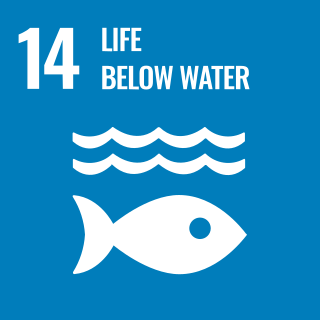
Sustainable Development Goal 14 is about "Life below water" and is one of the 17 Sustainable Development Goals established by the United Nations in 2015. The official wording is to "Conserve and sustainably use the oceans, seas and marine resources for sustainable development". The Goal has ten targets to be achieved by 2030. Progress towards each target is being measured with one indicator each.
The Twelfth Ministerial Conference (MC12) of the World Trade Organization (WTO) was a landmark event, marking the first Ministerial Conference held in nearly five years due to the COVID-19 pandemic. It brought together trade ministers and senior officials from all 164 WTO member countries to discuss and negotiate critical global trade issues.
References
- ↑ "2019: The Year to End Harmful Fisheries Subsidies".
- ↑ UNEP – United Nations Environmental Programme (2008) Fisheries Subsidies: A Critical Issue for Trade and Sustainable Development at the WTO: An Introductory Guide. UNEP, Geneva.
- ↑ "Scientists join international push to ban harmful fisheries subsidies". University of Western Australia. Retrieved 15 November 2021.
- ↑ Sumaila, U. Rashid; et al. (29 October 2021). "WTO must ban harmful fisheries subsidies" (PDF). Science. 374 (6567): 544. Bibcode:2021Sci...374..544S. doi:10.1126/science.abm1680. PMID 34709891. S2CID 240153044.
- ↑ McVeigh, Karen (21 June 2022). "First WTO deal on fishing subsidies hailed as historic despite 'big holes'". The Guardian.
- ↑ "Goal 14 targets". UNDP. Archived from the original on 2020-09-30. Retrieved 2020-09-24.
- ↑ Adam, David. "Majority of global fishing subsidies ‘harmful’, report finds." https://chinadialogueocean.net/11585-majority-of-global-fishing-subsidies-harmful-report-finds/#:~:text=In%20the%20most%20up%2Dto,went%20towards%20increasing%20catch%20capacity. Retrieved 21 September 2020.
- ↑ Johannesburg Plan of Implementation, paragraph 31(f).
- ↑ WTO (2005) Hong Kong Ministerial Declaration, Annex D paragraph 9.
- ↑ United Nations (2017) Resolution adopted by the General Assembly on 6 July 2017, Work of the Statistical Commission pertaining to the 2030 Agenda for Sustainable Development (A/RES/71/313)